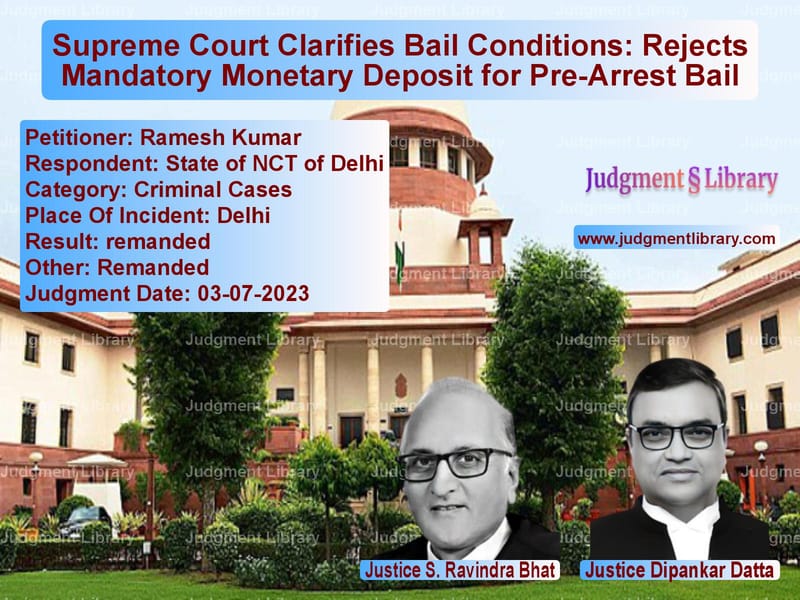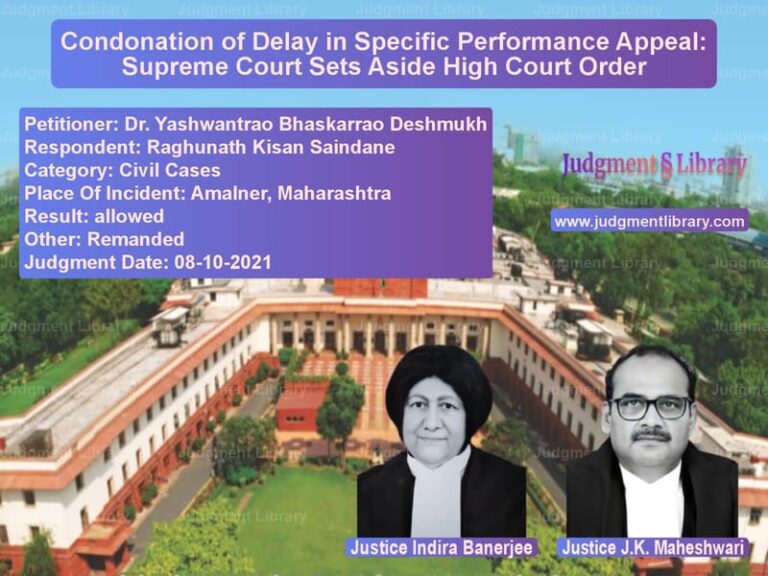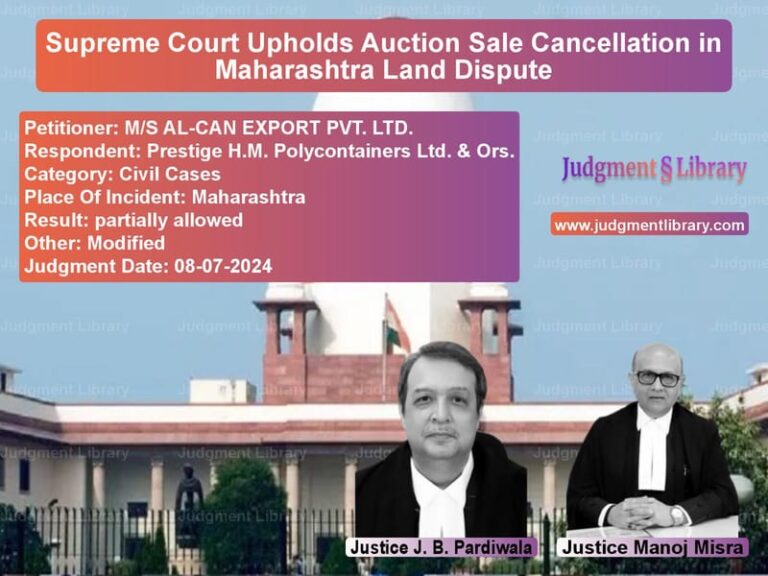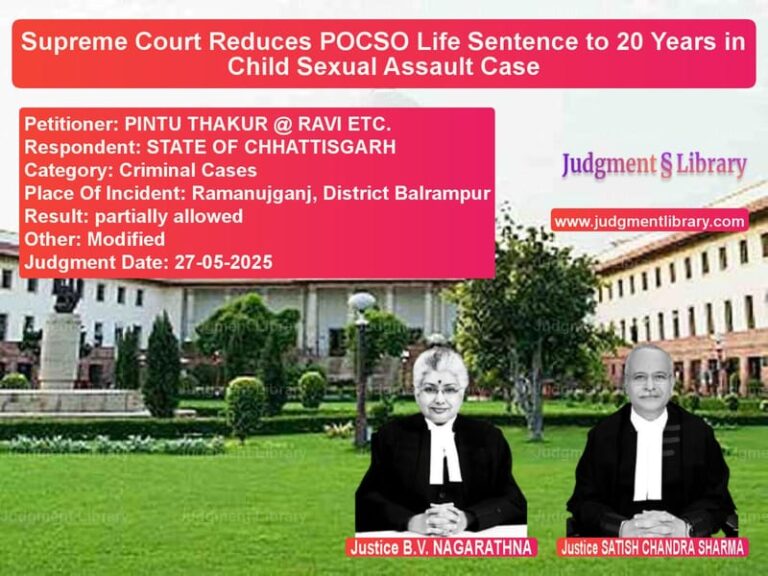Supreme Court Clarifies Bail Conditions: Rejects Mandatory Monetary Deposit for Pre-Arrest Bail
The case of Ramesh Kumar v. State of NCT of Delhi revolves around a dispute related to a real estate agreement and allegations of cheating. The Supreme Court ruled that imposing a monetary deposit as a condition for anticipatory bail is not legally valid. The judgment reiterates that bail conditions should not transform criminal proceedings into money recovery mechanisms.
Background of the Case
The dispute stems from real estate transactions between Ramesh Kumar, the appellant, and Ashwani Kumar, a builder. The complainants, Vinay Kumar and Sandeep Kumar, alleged that they were cheated of Rs. 35 lakh while trying to purchase a floor in a proposed multi-story building.
Key Developments Leading to Litigation
- December 2018: Agreements were executed between Ramesh Kumar (owner), Ashwani Kumar (builder), and the complainants for the purchase of the second floor of a proposed building.
- 2019: The builder initiated a civil suit against the complainants for non-compliance with the agreement.
- November 18, 2021: The complainants filed an FIR under Sections 420, 406, and 34 of the IPC, alleging cheating.
- November 30, 2021: A trial court granted interim protection from arrest to Ramesh Kumar.
- January 18, 2022: The trial court dismissed his anticipatory bail application.
- November 24, 2022: The Delhi High Court granted anticipatory bail but required him to deposit Rs. 22 lakh.
- July 4, 2023: The Supreme Court set aside the bail condition, remanding the case to the High Court.
Arguments Before the Supreme Court
Appellant’s Arguments
Ramesh Kumar, through his counsel, argued:
- The requirement to deposit Rs. 22 lakh for bail was unreasonable and excessive.
- There was no direct contract between him and the complainants.
- The complaint was a civil dispute disguised as a criminal case to recover money.
- His fundamental right to liberty should not be conditioned on financial deposits.
Respondent’s Arguments (State of NCT of Delhi)
The prosecution argued:
- The complainants had paid Rs. 17 lakh to Ramesh Kumar via cheques.
- The High Court order was based on an undertaking by Ramesh Kumar to deposit the money.
- Since the appellant had sought an extension of time to make the deposit, he could not challenge the condition.
Supreme Court’s Analysis and Judgment
A bench comprising Justices S. Ravindra Bhat and Dipankar Datta ruled that the bail condition requiring a monetary deposit was legally unsound.
Key Observations of the Court
1. Criminal Proceedings Are Not a Mechanism for Money Recovery
“The process of criminal law cannot be pressed into service for settling a civil dispute.”
The Court reiterated that financial disputes should be resolved through civil litigation, not bail conditions.
2. Bail Conditions Must Not Be Onerous
“Conditions for grant of bail must not be excessive, unreasonable, or disproportionate to the nature of the alleged offense.”
The Court ruled that monetary deposits should not be a prerequisite for liberty.
3. The High Court Erred in Accepting the Undertaking
“The undertaking given by the appellant does not justify the imposition of a monetary deposit as a bail condition.”
The Supreme Court clarified that a voluntary statement by the accused cannot form the basis of an unreasonable bail condition.
4. Precedents Against Imposing Monetary Conditions for Bail
The Court cited previous judgments, including:
- Gurbaksh Singh Sibbia v. State of Punjab (1980): Bail conditions must be fair and reasonable.
- Sumit Mehta v. State (NCT of Delhi) (2013): Bail cannot be used for financial recovery.
- Dilip Singh v. State of MP (2021): Courts should not act as recovery agents in financial disputes.
Final Verdict
The Supreme Court set aside the monetary deposit condition and remanded the matter to the Delhi High Court for reconsideration, stating:
“The impugned order is set aside. The High Court is requested to reconsider the anticipatory bail application without imposing an unreasonable financial condition.”
Until the High Court rules, Ramesh Kumar will remain protected from arrest.
Impact of the Judgment
This ruling has significant implications for bail jurisprudence:
- Prevents misuse of criminal proceedings: Civil disputes should not be turned into criminal cases for financial recovery.
- Clarifies bail conditions: Monetary deposits cannot be arbitrarily imposed as bail conditions.
- Strengthens procedural fairness: Courts must ensure bail orders do not become instruments of coercion.
Conclusion
The Supreme Court’s decision in Ramesh Kumar v. State of NCT of Delhi upholds the principle that bail conditions must be fair, just, and reasonable. The judgment serves as a critical reminder that criminal law cannot be used to enforce private financial transactions.
Petitioner Name: Ramesh Kumar.Respondent Name: State of NCT of Delhi.Judgment By: Justice S. Ravindra Bhat, Justice Dipankar Datta.Place Of Incident: Delhi.Judgment Date: 03-07-2023.
Don’t miss out on the full details! Download the complete judgment in PDF format below and gain valuable insights instantly!
Download Judgment: ramesh-kumar-vs-state-of-nct-of-delh-supreme-court-of-india-judgment-dated-03-07-2023.pdf
Directly Download Judgment: Directly download this Judgment
See all petitions in Bail and Anticipatory Bail
See all petitions in Fraud and Forgery
See all petitions in Extortion and Blackmail
See all petitions in Judgment by S Ravindra Bhat
See all petitions in Judgment by Dipankar Datta
See all petitions in Remanded
See all petitions in Remanded
See all petitions in supreme court of India judgments July 2023
See all petitions in 2023 judgments
See all posts in Criminal Cases Category
See all allowed petitions in Criminal Cases Category
See all Dismissed petitions in Criminal Cases Category
See all partially allowed petitions in Criminal Cases Category







